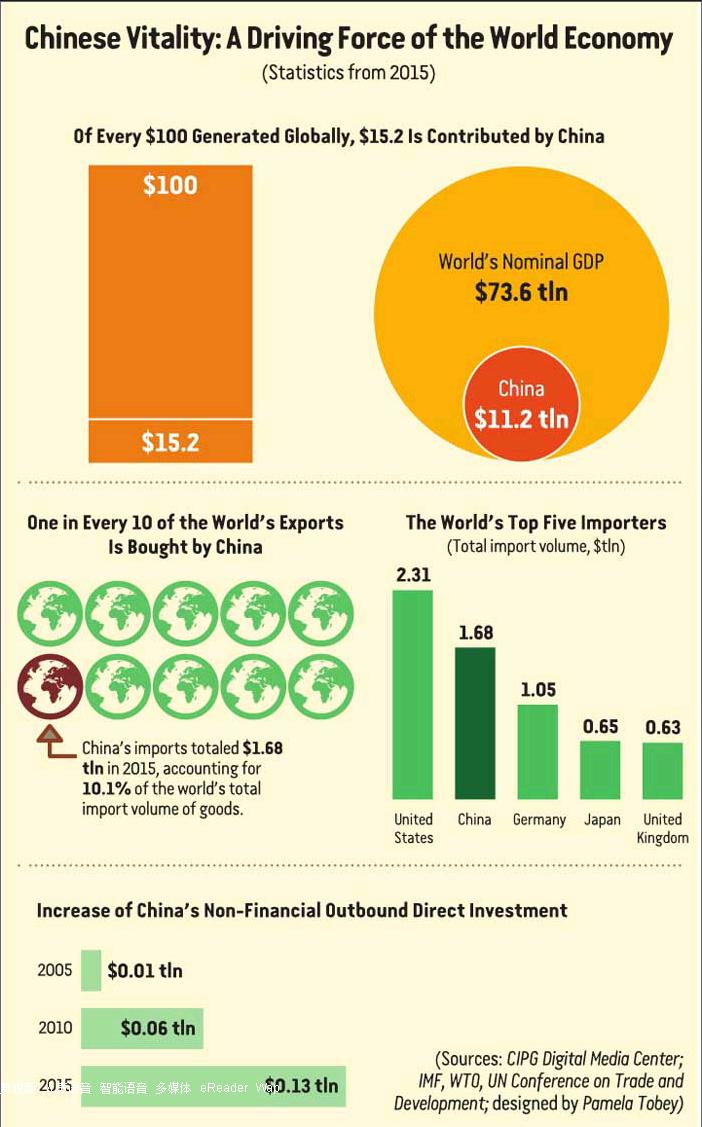A CLEAR VISION AMIDST UNCERTAINTY
By+Bai+Shi


For the first time, Chinas top leader ad- dressed global issues in the Swiss ski resort of Davos, where political and business elites from across the planet gathered at the World Economic Forum (WEF) Annual Meeting 2017. President Xi Jinping attended the opening session of the event on January 17, a key part of his state visit to Switzerland at the beginning of this year.
The WEF made Responsive and Responsible Leadership this years theme. In view of rising global uncertainty, driven by populist and anti-globalization sentiment, effective leadership is crucial. In Xis keynote speech in Davos, he called on the world to“jointly shoulder the responsibility of our times and promote global growth.”
The Davos forum is not only the worlds premier annual elite fest, but is also seen as a weathervane of the global economy. This years gathering embraced the largest ever Chinese delegation since the Chinese Government first took part in 1979 following the start of the nations reform and openingup drive one year earlier. Over the past three decades, China has become the worlds second largest economy, and the WEF Annual Meeting of the New Champions (also known as the Summer Davos) has also gained a foothold in China. Since 2007, two Chinese cities, Dalian and Tianjin, have taken turns to host the event.
“The Chinese presidents Davos attendance shows Chinas active stance in participating in global governance at the elite forum platform,” Peng Zhiwei, associate professor and Director of the Department of International Economics and Trade at Nankai University in Tianjin, told Beijing Review. Peng is also a member of the agenda panel for Summer Davos Tianjin.
“Chinese leaders have attended the Davos forum for three consecutive years. This implies that they pay much attention to the WEFs role in promoting consensus on global challenges,” Peng said. “The WEF always presents its foresight on world economic trends. Since its establishment, the forum has contributed much to promoting cooperation and narrowing differences as well as to improving global governance.”
According to Peng, Xis presence at the Davos forum is of great significance to the world given the current wave of populism in many developed economies, which has a destabilizing effect likely to alter the international landscape. Therefore, there is a lot of curiosity about the next step of the worlds second largest economy.
Xi spoke on globalization, trade protectionism, climate change, development and Chinas economy during his Davos speech, giving a Chinese perspective on global issues and clearly marking out a strategy for global recovery and prosperity.
Globalization irreversible
Historically, the West initiated economic globalization and benefited from the course. Yet now, some blame this trend for domestic problems. The anti-globalization voice is growing louder than ever in the West, with the world economy under threat from isolationism and protectionism.
At Davos, Xi illustrated the importance of economic openness, pointing out that many of the problems troubling the world are not caused by economic globalization. “Global economic depression strains the relations between growth and distribution, between capital and labor, and between efficiency and equity. Both developed and developing countries have felt the punch,” he said.
To counter such problems, “we should strike a balance between efficiency and equity to ensure that different countries, different social strata and different groups of people all share in the benefits of economic globalization,” Xi suggested.
Fan Yongpeng, a research fellow with the China Institute at Fudan University in Shanghai, echoed the presidents call. “Global issues generated in the course of globalization cant be solved by one country in a unilateral way. Even a superpower like the United States has become unwilling to undertake more work in international affairs,”Fan told Beijing Review.
Fan explained that despite various challenges at home and abroad, China works together with the international community. At the G20 Hangzhou Summit last September, Xi proposed a number of constructive ideas on global governance.
Growth prospects
Global economic growth is a quintessential topic at Davos this year, as the world economy has remained sluggish for years. Meanwhile, the gaps between the rich and the poor and between the South and the North are widening. To realize steady and healthy growth, as Xi pointed out, the world needs to presently address three critical issues—a lack of robust forces driving global growth, inadequate global economic governance and uneven global development.
Peng believes that new growth sources have yet to emerge and fresh drivers of development remain in incubation. He told Beijing Review, “We need to pay attention to the obstacles that hinder growth.”
According to him, trade protectionism in various forms is rising. Donald Trumps U.S. presidency increases the risk of trade conflict between the United States and other countries, he warned.
However, Xu Hongcai, Deputy Chief Economist at the China Center for International Economic Exchanges, is optimistic about global economic prospects in 2017. “In 2016, the world economy grew 3.1 percent year on year. I predict that figure will reach 3.3 percent and global trade will post 2 percent growth in 2017. The world economy is still on the way toward recovery,” Xu told Beijing Review.
He explained, “The U.S. economy had a robust recovery in the third and fourth quarters of 2016. It is expected that the Trump administration will adopt an expansionary fiscal policy combined with a tight monetary policy. I think the U.S. economy will perform solidly this year.”
Meanwhile, Chinas economy will maintain stable growth in 2017, perhaps at around 6.5 percent, according to Xu. He said along with economic recovery in the United States and Europe, Chinas exports would jump, which would drive Chinese economic growth this year.
During his presidential campaign, Trump repeatedly threatened to impose high tariffs on Chinese imports in a typical gesture of trade protectionism. Many worry that Trumps policy could trigger a trade war with China.
Xu stressed that trade protectionism will benefit no one. “Trump promises to revive U.S. industry. He is very likely to pursue an expansionary fiscal policy, including tax cuts and investment increases in infrastructure construction. This will intensify the U.S. balance of payments deficit. Thus, the U.S. market needs foreign investment, including Chinas,” Xu said.
At the same time, China also welcomes the participation of U.S. businesses in building the Silk Road Economic Belt, a multilateral economic cooperation initiative proposed by Xi in 2013. The potential is great for enhancing economic and trade cooperation between China and the United States, Xu asserted.
Xi used an appropriate metaphor to depict trade protectionism in his speech in Davos, “Pursuing protectionism is like locking oneself in a dark room. While wind and rain may be kept outside, that dark room will also block light and air. No one will emerge as a winner in a trade war.”
Chinas evolving role
In Davos, Xi also reiterated Chinas willingness to share the great opportunities presented by the nations development with other countries. “We will open our arms to the people of other countries and welcome them aboard the express train of Chinas development,” he said.
Over the past three decades, China has maintained rapid economic growth. Despite a fragile global situation, the Chinese economy grew 6.7 percent year on year in 2016, still one of the highest economic growth rates in the world, according to Chinas National Bureau of Statistics. In addition, China remained the top engine of global growth last year by contributing 33.2 percent of the worlds economic expansion.
In terms of trade, China has been the worlds largest cargo trader for four consecutive years and is also the globes largest exporter and second largest importer. China has opened 104 of its 160 service sectors to foreign investors according to its membership commitment to the World Trade Organization. The nation is also making ef- forts to reduce tariffs and promote free trade with the rest of the world.
“China provides the world with a huge market, so other economies have benefited from Chinas economic development,” said Zhao Ping, Research Director at the Academy of the China Council for the Promotion of International Trade, in an interview with Beijing Review.
She believes that China will play a bigger role in promoting free trade and the reform of global governance structures.“In future, China should work to close the global North-South divide and promote inclusive and sustainable development that seeks common interests,” Zhao said.

